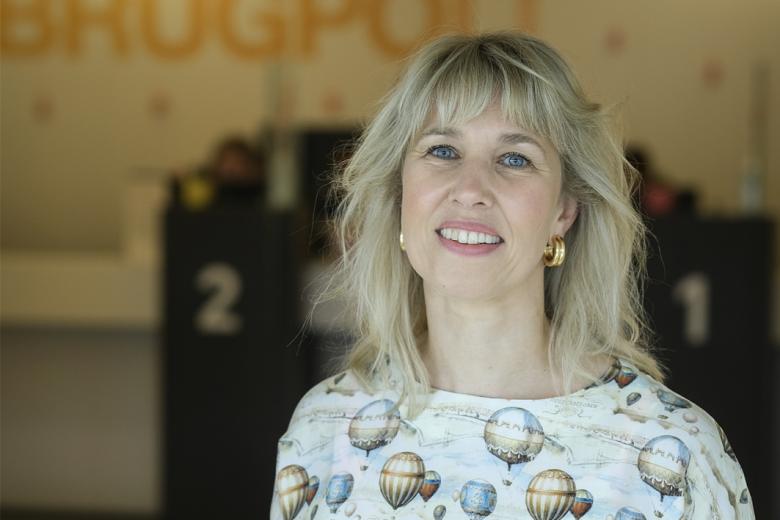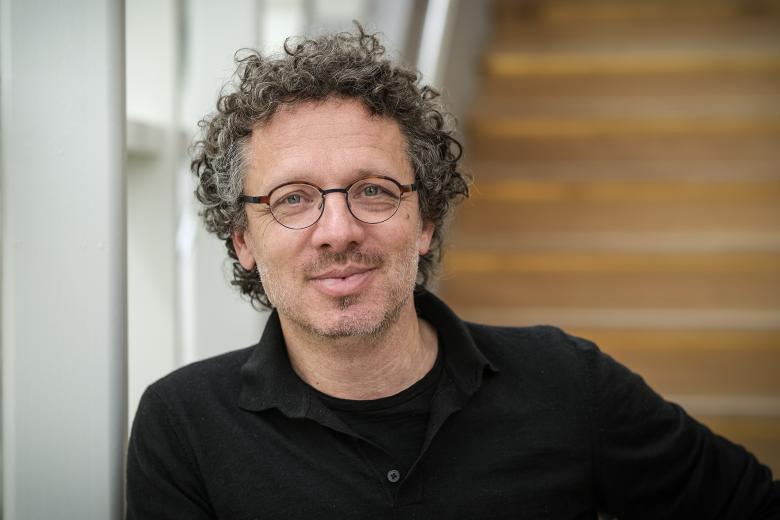“Academic and support staff can learn a lot from each other”
For 40 years already, Annemie Mordant has been convinced that academic and support staff are stronger together. Until her retirement, as the head of MEMIC (the centre for research data management), she dedicated herself to optimally facilitating collaboration between academic and support staff. “We can all learn from and support one another in conducting research, each from our own perspective.” In those 40 years, Mordant has seen a lot change in the area of research support—from digitisation to stricter legislation and to open science. Now that Mordant is retiring, how does she reflect back on the past 40 years of research data management?
Mordant is from the era in which surveys on paper and by telephone were the prime data collection methods. She started her career as a dietician in nutrition research, but was soon charmed by the world of research. So, she traded in her field as a dietician to learn more about scientific research and to support it optimally.
It was then that she also became fascinated by data collection, data use and data storage. In 1983, Mordant and her colleagues still typed up research results onto the computer. “There was only one VAX computer available in the BioMedical Centre”, she explains. She couldn’t help but ask herself, “How does a computer like this actually work?”. For this reason, she became inspired to delve into the world of IT by taking evening classes. “I wanted to understand how certain processes worked exactly”, she explains.
Cross-pollination between academic and support staff via MEMIC
With plenty of IT and research knowledge in her pocket, Mordant took on the role of data manager at MEMIC in 2001. MEMIC is the centre for data and information management at the Faculty of Health, Medicine and Life Sciences of Maastricht University and the MUMC+. The centre supports researchers, PhD students and students in collecting data and managing information on their path towards new knowledge. Mordant explains: “Good and reliable data is essential in this process; especially if you want to reuse the data.”
Mordant has been convinced throughout her career that academic and support staff should not work separately. Collaboration between them is at the core of MEMIC. She explains: “We can help one another by joining forces as soon as a research question has been set. We can all benefit from the experiences we have gained. In this way, we can offer better support and researchers can have a part of their research carried out by MEMIC. All in all, this leads to great cross-pollination!”
One contact point for research support
Mordant underlines the importance of research support in all research steps and would therefore like to see one contact point set up for researchers to consult regarding all of their questions. The research support provided through MEMIC and the organised cross-pollination that it facilitates are unique among the Dutch universities. Mordant sheds light on this: “What is unique is that we also carry out our own recommendations ourselves. It is precisely through conducting research that we continuously learn.”
She continues: “At many universities, research support is centrally organised through the university library. The library is responsible for scientific output through publications and articles and also for data. But this demands a lot more specialist expertise, for instance to work with data correctly or to create an app for data collection. In addition, privacy plays a role. At MEMIC, we are specialised in these topics and we explore how we can optimally facilitate researchers while taking into account the relevant regulations and legislation.”
What is unique is that we also carry out our own recommendations ourselves. It is precisely through conducting research that we continuously learn.
Annemie MordantSuccessful collaboration between academic and support staff
A researcher who can speak to the successful collaboration between academic and support staff is Prof. IJmert Kant. He is Professor of Occupational Epidemiology at the School for Public Health and Primary Care—and he’s a former colleague of Mordant’s. He also acted as moderator during Mordant’s farewell symposium on 14 September. They still know each other from the Epidemiology department, where Mordant says she learned how to combine theory and practice in scientific research.
And Mordant and Kant still regularly work together today. Kant explains: “MEMIC helps our department to use the available knowledge and to collect data efficiently and then store it in accordance with legislation.”
Mordant adds: “We find it important to be involved in the entire trajectory. Forty years ago, a grant provider would never have asked how you planned to collect and handle data. Nowadays, you need to submit a data management plan when even requesting a grant. MEMIC provides help with this. For example, we have developed professional templates with which researchers can fill out a data management plan themselves, and we have a GDPR register in which the answers to important legal questions are addressed.”
Continuous change
Research data management has not stood still once in the 40 years that Mordant has worked in the field, from her first study as a dietician until her retirement. Examples like the emergence of the worldwide web in the 1990s and, more recently, open science and open access highlight this. On top of that, stricter regulations and legislation are always being developed. And new developments like the FAIR principles and AI result in a continuously adapting demand for support in research data management.
Kant concludes: “The content of our work is changing constantly through technological, legal and societal developments. Aligning research support with research has become more complex, while the importance of this alignment has simultaneously increased in order to be able to respond to these changes on time.”
Mordant believes in an iterative working method—learning by doing and making constant adjustments—to be able to handle these changes. “At MEMIC, we are always faced with two challenges: knowing what the researcher is working on and possessing the right knowledge and techniques for this (or finding where this is available). By remaining flexible in this, we can also support researchers into the future.”
Forty years ago, a grant provider would never have asked how you planned to collect and handle data. Nowadays, you need to submit a data management plan when even requesting a grant.
Annemie Mordant“Research must remain feasible”
Are these changes sometimes difficult to manage? Mordant admits that increased regulations and legislation makes conducting research harder. “Of course, it is important to handle privacy-sensitive data in accordance with all regulations and legislation. But we must also ensure that research remains feasible. Researchers are tired of constantly hearing ‘no’, especially if they have put in a lot of time to submit a grant application. That is why we, at MEMIC, search for solutions within regulations and legislation at the start of each research project.”
One important tool that MEMIC has developed to satisfy new privacy legislation is Ldot. Researchers can use it to save personal data separately from the answers given by respondents. “In this way, you as a researcher can use the results but cannot derive who gave which answer”, explains Mordant.
Kant has also positively experienced this system. “We are conducting research into the sustainable employability of fire brigade staff, among other things. In this large-scale study, automation and digitisation is desperately needed, so we discussed the possibilities with MEMIC. The Ldot system is very useful for us. Thousands of research invitations can be sent at one time in this system. It then automatically monitors who has participated and completed the survey. It is great that this process is pre-programmed and satisfies all legislation, while we also have control over what is happening.”
Of course, it is important to handle privacy-sensitive data in accordance with all regulations and legislation. But we must also ensure that research remains feasible.
Annemie MordantWalking into her early retirement
Soon, Mordant will pass the baton as head of MEMIC to the current deputy head Jacqueline Pisters, so that she can enjoy her early retirement. On Thursday 14 September, Mordant stood in the spotlight during her farewell symposium, ‘40 jaar onderzoeksondersteuning binnen Life Sciences’ (40 years of research support within Life Sciences). During the symposium, she also received the MUMC+ golden heart as a thank-you for her commitment over the past 40 years.
Mordant reflects on the past and looks to the future with satisfaction: “I am leaving something nice behind with MEMIC and I have faith that MEMIC, together with other research supporters, can create one contact point for a researcher to consult about all their questions. I hope that researchers and supporters keep strengthening one another.”
Does Mordant have any plans for the coming period? Her gift idea on the symposium invitation gives us a hint: a contribution towards walking boots. As an avid walker, she wears out her boots at a rapid pace. “I enjoy walking together with my Nordic walking group. I am and will remain a team player. At work, and beyond!”
I hope that researchers and supporters keep strengthening one another.
Annemie MordantText: Romy Veul
Also read
-
Fresh air
Newly appointed professor Judith Sluimer (CARIM) talks about oxygen in heart functioning and the 'fresh air' the academic world needs.
-
Huntington’s is a disease you don't carry alone
Mayke Oosterloo is a movement disorders neurologist at Maastricht UMC+ and a researcher at the MHeNs institute of Maastricht University. In the outpatient clinic and various nursing homes in Limburg, she guides and treats patients (and their loved ones) with Huntington's disease.
-
Trauma-Free Care for Sick Children
Drawing blood, inserting an IV, or looking into the ear; even seemingly simple medical procedures can cause anxiety, pain, and stress in children. According to pediatric intensivist Piet Leroy, comfort and trust are just as important as the medical treatment itself. Therefore, he is researching how...